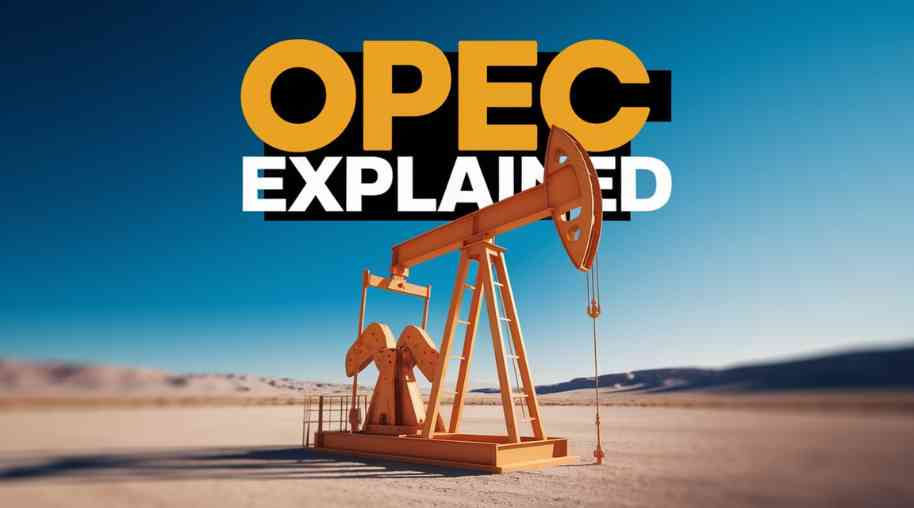OPEC Full Form-Organisation of Petroleum Exporting Countries
by Shashi Gaherwar
0 1013
Organization of the Petroleum Exporting Countries (OPEC): Role, Impact, and Future Prospects
Introduction
The Organization of the Petroleum Exporting Countries (OPEC) is a global intergovernmental organization responsible for coordinating and stabilizing the oil markets by regulating the supply of crude oil. Established in 1960, OPEC has played a crucial role in shaping global energy policies, influencing oil prices, and ensuring stability in the petroleum industry.

Comprising 13 member countries, OPEC controls around 80% of the world’s proven crude oil reserves and accounts for nearly 40% of global oil production. The organization’s decisions significantly impact fuel prices, inflation, and economic policies worldwide.
This article explores OPEC’s history, functions, influence on global energy markets, challenges, and future outlook.
History and Formation of OPEC
OPEC was founded on September 14, 1960, in Baghdad, Iraq, by five original members:
• Iran
• Iraq
• Kuwait
• Saudi Arabia
• Venezuela
The organization was established as a response to Western oil companies’ control over crude oil pricing and production. OPEC sought to unify petroleum policies among member nations and safeguard their economic interests by regulating oil output.
Since its inception, OPEC has expanded, and today its 13 members include:
• Algeria
• Angola
• Congo
• Equatorial Guinea
• Gabon
• Iran
• Iraq
• Kuwait
• Libya
• Nigeria
• Saudi Arabia
• United Arab Emirates (UAE)
• Venezuela
The organization’s headquarters is located in Vienna, Austria.
Functions and Objectives of OPEC
OPEC’s primary goal is to coordinate and unify petroleum policies among its member countries. Its main functions include:
1. Regulating Oil Supply
• OPEC adjusts crude oil production levels to maintain a balance between supply and demand.
• Reducing or increasing oil output helps stabilize global oil prices.
2. Stabilizing Oil Markets
• By managing oil production, OPEC aims to prevent market volatility.
• Stability ensures that both producers and consumers benefit from predictable pricing.
3. Influencing Global Oil Prices
• OPEC’s production decisions impact oil price fluctuations.
• Higher production reduces prices, while lower output raises them.
4. Ensuring Fair Revenue for Oil-Producing Nations
• OPEC’s policies protect the economic interests of its member countries, ensuring fair pricing for crude oil exports.
5. Collaboration with Non-OPEC Producers
• OPEC partners with non-member oil-producing countries, such as Russia, through OPEC+, a broader coalition that influences global energy policies.
Impact of OPEC on the Global Economy
OPEC’s policies affect multiple sectors worldwide, including energy markets, economies, and geopolitical relations. Some key impacts include:
1. Oil Price Control
• OPEC’s production quotas significantly impact gasoline and fuel prices globally.
• High oil prices can lead to inflation, increasing costs for transportation, manufacturing, and households.
2. Energy Security
• OPEC ensures a stable global oil supply, preventing sudden shortages or excessive surpluses.
3. Economic Influence on Oil-Importing Nations
• Countries dependent on OPEC oil (e.g., India, China, and the US) must adjust their energy policies and trade strategies based on OPEC decisions.
4. Geopolitical Tensions
• OPEC’s influence extends to global politics, as oil plays a crucial role in international relations.
• Economic sanctions and diplomatic negotiations often involve OPEC members, impacting global trade agreements.
Challenges Faced by OPEC
While OPEC has been a dominant force in the oil industry for decades, it faces several challenges in the modern energy landscape:
1. Rising Competition from Non-OPEC Producers
• The emergence of US shale oil production has reduced OPEC’s market dominance.
• Countries like Russia, Canada, and Brazil have increased output, challenging OPEC’s influence.
2. Shift Towards Renewable Energy
• Growing investments in solar, wind, and electric vehicles (EVs) threaten the long-term demand for oil.
• Governments worldwide are pushing for cleaner energy alternatives to reduce carbon emissions.
3. Internal Conflicts and Political Instability
• Some OPEC nations, such as Venezuela, Libya, and Iran, face internal crises that disrupt production and unity within the organization.
4. Global Economic Uncertainty
• Economic downturns, such as the COVID-19 pandemic, have led to reduced oil demand and price volatility.
• OPEC must adapt its strategies to balance supply and demand in fluctuating economic conditions.
OPEC’s Future Prospects
Despite challenges, OPEC is evolving to maintain its relevance in the global energy sector. Some strategies include:
1. Strengthening OPEC+ Alliances
• OPEC has expanded its partnerships with non-member countries through OPEC+, including Russia and Kazakhstan, to enhance market stability.
2. Investment in Alternative Energy
• Some OPEC members, like Saudi Arabia and UAE, are investing in renewable energy projects, such as hydrogen and carbon capture technologies.
3. Market Adaptation Strategies
• OPEC continues to adjust its production quotas and pricing models to remain competitive.
• The organization is working on policies that balance traditional oil production with emerging energy trends.
4. Focus on Sustainable Oil Production
• With increasing climate concerns, OPEC is exploring carbon-neutral oil production methods and cleaner extraction technologies.
The Organization of the Petroleum Exporting Countries (OPEC) has been a key player in the global energy industry for over six decades. By regulating oil production, stabilizing markets, and influencing global prices, OPEC has shaped economic policies worldwide.
However, technological advancements, renewable energy trends, and geopolitical challenges are transforming the oil industry. To remain relevant, OPEC must adapt to shifting energy demands, strengthen global partnerships, and explore sustainable solutions.

Share:








Comments
Waiting for your comments